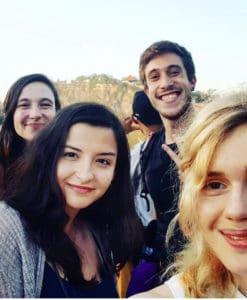Taking an ‘Asian perspective’ on Mediation. Member Spotlight: Maja Liechti
In the last decades, an increasingly participated current of thought has been pushing for questioning and rethinking the status of international studies concerning mediation and peacebuilding, as considered excessively Western-centred. One of the most prominent alternative perspectives to the Westernized paradigm comes from the East of the world. It is exactly the desire of bringing the ‘Asian perspective’ under the spotlights that motivated Maja Liechti to leave Switzerland to conduct her university studies in Japan. In fact, she is currently an undergraduate student at the University of Tokyo, being enrolled in the Japan in East Asia and Global Leadership Program. Additionally, she is an active member of the Global Peacebuilding Association of Japan and Mediators Beyond Borders International, after she had the opportunity to join the MBBI 2019 Bali Congress.
Aiming to the Far East
 Maja’s passion for the Asian world emerged when she took a language exchange in Japan at the age of 17, moved by a great curiosity about discovering such a different culture with respect to the Swiss context she had grown up in. Back then, what had immediately amazed her about the Japanese culture was the very low level of conflict existing within the Japanese society on an inter-personal level, standing on norms, ideals, and values fundamentally rooted in harmony and a group-oriented mindset.
Maja’s passion for the Asian world emerged when she took a language exchange in Japan at the age of 17, moved by a great curiosity about discovering such a different culture with respect to the Swiss context she had grown up in. Back then, what had immediately amazed her about the Japanese culture was the very low level of conflict existing within the Japanese society on an inter-personal level, standing on norms, ideals, and values fundamentally rooted in harmony and a group-oriented mindset.
When Maja finished high school, she initially furthered her studies choosing a Political Science degree at the University of Zurich. However, she felt somehow dissatisfied with the excessive focus given to Western thinkers and theories on IR. “I soon realized that most of the readings and sources we were given were written by Western scholars and provided their perspectives. However, I was curious about how other nations physically perceive the world and the international system, and especially the power balance between the East and the West”. Following this interest, Maja decided to apply to a degree course in Japan, initially studying law at Nagoya University, and afterward moving to the University of Tokyo. The international program she is undertaking focuses on an interdisciplinary approach to Asian diplomatic relations and global governance. As part of her bachelor, Maja centered her academic curriculum on the peacebuilding strand, following which she is at the moment engaged in researching the meditation efforts between the United States and Iran and the involvement of Japan and China therein.
By living in Japan, Maja could get innovative perspectives not exclusively related to the academic sphere. Particularly, she could first-hand experience and appreciate the social order and peculiar norms existing within a society widely different from Western nations. For instance, she was impressed by the fact that, differently from most of the European societies, the harmony of the social group within the Japanese society is usually put over the safeguards of individualistic needs and interests, and this enhances an almost-natural conflict-preventive social surrounding. Nevertheless, she was not always exempted by a typical ‘cultural shock’ when dealing with strikingly different customs and habits of the Japanese collectivity. On this, Maja provides an example related to the sports environment: “When I joined a sports club in Japan, I noticed that I was always required to attend the sessions even when it was not important or necessary for my training process, and this is deeply connected to the ritualized strengthening of group dynamics that are fundamental within the Japanese society”.
A pro-active and ambitious personality
 Despite her young age, Maja’s portfolio already abounds of experiences, expressing her pro-active and dynamic personality. In 2016, she volunteered for a couple of months in a Refugee Camp in Dunkirk, and then for a Serbia-based organization working likewise with refugees in the Balkans Border-free. In Tokyo, she stands as a Board Member of the Global Peacebuilding Association of Japan and the Assistant to the Director of the ACUNS Office in Tokyo, supporting the organization of the Geneva and New York Dialogues (this latter was eventually canceled due to the outbreak). These are envisioned as dialogic encounters gathering Asian scholars and representatives of several UN organizations from different parts of the globe in order to discuss current issues on peacebuilding and other peace-related topics.
Despite her young age, Maja’s portfolio already abounds of experiences, expressing her pro-active and dynamic personality. In 2016, she volunteered for a couple of months in a Refugee Camp in Dunkirk, and then for a Serbia-based organization working likewise with refugees in the Balkans Border-free. In Tokyo, she stands as a Board Member of the Global Peacebuilding Association of Japan and the Assistant to the Director of the ACUNS Office in Tokyo, supporting the organization of the Geneva and New York Dialogues (this latter was eventually canceled due to the outbreak). These are envisioned as dialogic encounters gathering Asian scholars and representatives of several UN organizations from different parts of the globe in order to discuss current issues on peacebuilding and other peace-related topics.
Moved since she was a teenager by the desire to take a stance vis-à-vis the human tragedies of our time and profoundly inspired by the words of Immanuel Kant in its masterpiece “Perpetual Peace”, Maja aspires to assert herself as a peacebuilder and mediator professional. However, as far as she is studying and exploring the field of peace studies, Maja does not want to shut any door. Rather, she aims to gain as much experience as possible from as many different working experiences as possible, in order to develop expertise over conflict management and prevention capable of escaping pre-fixed thinking paradigms. “I believe that thinking in particular patterns makes you blind to certain facts”, she acknowledges. Her continuous curiosity and interest for very disparate topics, such as International Humanitarian Law and Neuropsychology, certainly represents a tireless engine that is leading Maja towards a bright future for what concerns her personal and professional objectives.
Japan and mediation
The role played by mediation in Japanese society is rather different than in Western contexts. Although at the inter-state level the Japanese government is often involved in mediation efforts in the international arena, such as in the occasion of the negotiations between Washington and Teheran, mediation is not widely contemplated internally. Maja explains that this phenomenon is certainly related to the Japanese conflict-avoidance culture. “People usually avoid bringing up any topic that could lead to a discussion or argument, to avoid tensions, or they would be too reserved to bring in a third-party mediator to resolve a conflict having to do with very personal matters; they would rather avoid the other person”. To this point, litigation exists but it is mostly performed relating to issues that are very factual and impersonal.
 “There exist certain aspects of the Japanese culture one could learn from and incorporate them into mediation efforts”, Maja states. It is undoubted that Western models of mediation could draw useful insights from the Japanese perspective on mediation and its conflict prevention culture. One of these elements is the principle of ‘self-efficacy’ (roughly translated from the Japanese), which pushes the individual to prioritize the wellbeing of the group and group dynamics’. In such a reflective process, the person is prompted to reflect on the problem and how their actions contributed to it on their own, instead of accusing or blaming others. Reflecting in terms of group dynamics and group harmony above individual needs could bring an added value to mediation, in the way the parties could be invited to reflect more in terms of higher priorities and values than relying on their individualistic stances. “I believe that these ideals could support mediation to achieve the wished res ults faster and more effectively because parties would be adopting a different way of thinking, putting the highest priority into question on the dynamic of the group”, Maja recognizes.
“There exist certain aspects of the Japanese culture one could learn from and incorporate them into mediation efforts”, Maja states. It is undoubted that Western models of mediation could draw useful insights from the Japanese perspective on mediation and its conflict prevention culture. One of these elements is the principle of ‘self-efficacy’ (roughly translated from the Japanese), which pushes the individual to prioritize the wellbeing of the group and group dynamics’. In such a reflective process, the person is prompted to reflect on the problem and how their actions contributed to it on their own, instead of accusing or blaming others. Reflecting in terms of group dynamics and group harmony above individual needs could bring an added value to mediation, in the way the parties could be invited to reflect more in terms of higher priorities and values than relying on their individualistic stances. “I believe that these ideals could support mediation to achieve the wished res ults faster and more effectively because parties would be adopting a different way of thinking, putting the highest priority into question on the dynamic of the group”, Maja recognizes.
Mediation as it stands today has been mainly hinging on Western-centred notions and models. However, the expansion of its borders with the inclusion of non-Western views on conflict prevention and transformation own an invaluable potential, besides making the practice of mediation more inclusive and desirable across cultural and social discrepancies in very different societies. Maja is among the young scholars and change-makers of tomorrow that are determined to contribute to give prominence to the ‘Asian perspective’. As a demonstration of her determination, Maja concludes by citing a quote from the Japanese philosophy that particularly inspires her, and which finds itself notably appropriate for the overall mission of MBBI: “If you put a bit of water on a hot stone, this does not change anything, but if there are many drops, the stone will eventually cool”.
Written by Matteo Piovacari: MBBI Writer
